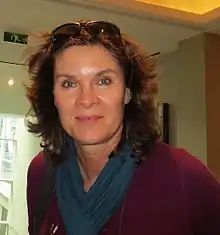Ulrike Meyfarth
Ulrike Nasse-Meyfarth (German pronunciation: [ʊlˈʁiːkə ˈmaɪfaːɐ̯t] ⓘ; born 4 May 1956) is a German former high jumper. She won the Olympic title twice, in 1972 and 1984. She is the youngest Olympic champion ever in women's high jump, and at the time of her 1984 triumph, she also was the oldest ever.[4]
 Ulrike Meyfarth in November 2012 | |
| Personal information | |
|---|---|
| Born | 4 May 1956 (age 67)[1] Frankfurt am Main, West Germany[1] |
| Height | 1.88 m (6 ft 2 in)[1] |
| Weight | 70 kg (154 lb)[1] |
| Sport | |
| Sport | Athletics |
| Event(s) | High jump |
| Club | LG Rhein-Ville ASV Köln Bayer Leverkusen |
| Achievements and titles | |
| Personal best(s) | 2.03 m (1983)[2][3] |
Medal record | |
Biography

The athletic career of Meyfarth took off quickly. In 1971, when she was only fifteen, she already placed second at the West German Championships, and the following year she qualified as the third member of the West German team for the 1972 Summer Olympics that were held in Munich.
Meyfarth was one of the few jumpers who had already adopted the new high jumping style first displayed by Dick Fosbury at the Mexico Olympics four years earlier. Not much was expected from Meyfarth, who had a 1.85-metre personal best. Yet in front of the patriotic home crowd, she rose to the occasion and improved her best by 5 cm to reach 1.90 metres – enough to secure the gold medal. She added another 2 cm to equal the standing world record and became the youngest Olympic champion in athletics in an individual event, at only 16 years old.
Her career stagnated after this surprising victory, and she didn't improve on her 1.92-metre mark until 1978. She did not win any titles in the meantime, placing 7th and 5th at the 1974 and 1978 European Championships, and not reaching the final of the high jump competition at the 1976 Montreal Games. Because of the West German boycott of the 1980 Moscow Olympics, she did not compete there.
1982 was Meyfarth's comeback year.[5] She won the European championships indoor and outdoor, and set a new world record of 2.02 m on the latter occasion.[3] In 1983, she finished second at the first World Championships, after a close fight with Tamara Bykova, whom she had beaten at the European Championships the year before. At a competition in London, both Bykova and Meyfarth cleared 2.03 m, again a new world record.[3] Bykova added another centimetre to this mark just four days later.
The 1984 Summer Olympics event in Los Angeles was Ulrike Meyfarth's last major championship. Several of her toughest competitors, including Bykova, were absent because most of the East Bloc nations boycotted the Olympics. She defeated the reigning Olympic champion – Italy's Sara Simeoni – and cleared 2.02 meters to win her second Olympic title. This time, Meyfarth was the oldest woman to win the Olympic high jump title.
She started her career in the club LG Rhein-Ville, becoming the West German national silver medalist in 1971 and bronze medalist in 1972. She then moved to ASV Köln and became the West German champion in 1973, 1975, 1979, and 1980–1983. She also took another bronze in 1976 and silvers in 1978 and 1984.[6]
Personal life
In 1983 she posed naked as a model for "The Highjumper", a bronze sculpture by Arno Breker. In 1987 she married Roland Nasse, a lawyer from Cologne. With him and their two daughters,[7] she lives in Odenthal,[8] a town north of Cologne. Nasse-Meyfarth studied at the Deutschen Sporthochschule Köln (DSK).[9] She is a diplomated sports teacher and since 1997 a trainer and talent scout at German sports club TSV Bayer 04 Leverkusen (as of 2019).
International competitions
1 Representing Europe
References
- "Ulrike Meyfarth". Olympedia.org. OlyMADmen. Retrieved 4 February 2023.
- Ulrike Meyfarth. iaaf.org
- Ulrike Meyfarth. trackfield.brinkster.net
- Evans, Hilary; Gjerde, Arild; Heijmans, Jeroen; Mallon, Bill; et al. "Ulrike Meyfarth". Olympics at Sports-Reference.com. Sports Reference LLC. Archived from the original on 17 April 2020. Retrieved 4 February 2023.
- "Ulrike Meyfarth". IMDb.
- Leichtathletik – Deutsche Meisterschaften (Hochsprung – Damen) Archived 11 July 2011 at the Wayback Machine. Sport-komplett.de. Retrieved on 4 July 2016.
- (in German) Ulrike Meyfarth biographical notes Archived 30 December 2010 at the Wayback Machine. ulrike-meyfarth.de
- (in German) Infos about Ulrike Meyfarth. wissen-digital.de
- "Bekannte Studierende und Alumni".
External links
- Leverkusen who's who
- Ulrike Meyfarth official site (in German)